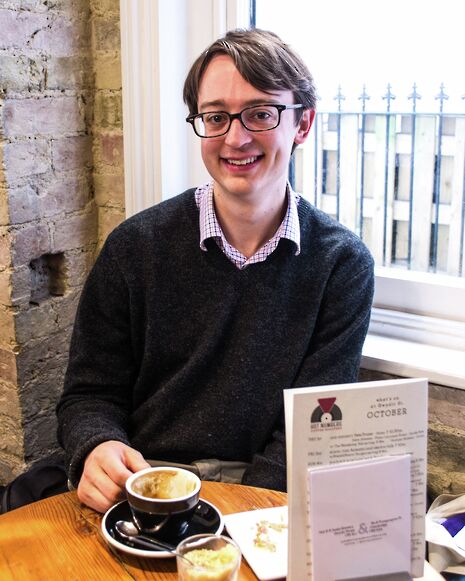Interview: Gabriel Lambert
Joy Thompson chats to Gabriel Lambert, the director of the global health think tank for students, Polygeia

Gabriel Lambert, co-founder and director of the global health think tank Polygeia, wants students to be an integral part of science policy. Polygeia is purely student-run – Lambert himself is a graduate medical student – and I caught up with him during a flying visit to Cambridge to learn the story behind this unique organisation.
Polygeia’s job, like that of many other policy think tanks, is to research and write briefing documents for policymakers. Since its beginnings in 2014, Polygeia has attracted an eclectic client list, some of whom are quite high-profile; their flagship commission is a report on the UK’s response to the Ebola crisis, written for the African All-Party Parliamentary Group. Polygeia currently does all its work pro bono, but next year according to Gabriel they plan to “convert to a sustainable model, possibly involving grants, corporate sponsorship, and paid commissions.”
Polygeia grew out of both Gabriel’s previous experiences with NGO work and his collaborations with the other founder, Hari Jeyabelen. The short-term motivation, he explains, “was seeing another paper presented in the House of Lords by the Wilberforce Society”, where he was deputy Director for Policy: “It was received very well, so I wanted to replicate that but on a larger scale.” Before starting Polygeia, Gabriel and Hari had worked together for both the Wilberforce Society and MedSIN, another student-led charity. Surprisingly, though, Gabriel himself came to medicine and public health via a History BA at Oxford; he switched after “spending a lot of time working for an NGO in Western Kenya.”
“I found that I wanted a job where the skills would be internationally useful,” Gabriel says, “but also evidence-based. I also discovered that I liked people, not pieces of paper!” he said.
For Gabriel, Polygeia is a “way to bridge the two worlds of the humanities – in the broadest sense – and medical science.” He relishes the potential to create truly multidisciplinary teams, which might combine any number of specialists, from medics to public health experts and anthropologists: “share and compare” is the motto here. The reference to anthropology comes from the Ebola paper, says Gabriel. “We needed the insight of the anthropologists to explain the distrust of doctors that was often observed.”
The cross-disciplinary nature of a Polygeia team also means that members get lots of practice communicating with others outside their fields. “Scientists and doctors need to communicate effectively with decision makers and engage well with politicians,” he says. “There’s no excuse for a translation barrier between disciplines.”
“Students in particular have a lot to offer,” Gabriel tells me. “They have the skills, passion and creativity, but most importantly can bring a fresh set of eyes to a problem. We get first- and second-year undergraduates working together with PhD [students] on the same project, and that’s really special,” he says. Indeed, Polygeia’s niche now seems to be training the next generation of policy-makers, while simultaneously benefiting the field of public health. “The quality of our people and work is very high but can be delivered at a lower cost – this lets us reach a larger variety of clients, especially the smaller charities.”
So where to next? Polygeia now has a competitive year-long placement in Cambridge’s Social Incubator East, a support system for social enterprise that provides the infrastructure and training to turn small start-ups into independently functioning businesses. This is even more impressive considering that the incubator isn’t primarily student-targeted. The move has come with a few surprises: one part of the culture shock was getting used to having “a 30-second pitch on what your organisation is about. It’s the Three-Minute Thesis of the policy world!” he laughs.
To close, I challenge Gabriel to give me a 30-second summary of the next greatest challenge to global health. His reply: “I think all issues will be either shaped heavily or made completely redundant by climate change – the economic and political destabilisation that results will overshadow everything else.” Food for a policymaker’s thought, indeed.
 News / Copycat don caught again19 April 2024
News / Copycat don caught again19 April 2024 Theatre / The closest Cambridge comes to a Drama degree 19 April 2024
Theatre / The closest Cambridge comes to a Drama degree 19 April 2024 Interviews / ‘People just walk away’: the sense of exclusion felt by foundation year students19 April 2024
Interviews / ‘People just walk away’: the sense of exclusion felt by foundation year students19 April 2024 News / AMES Faculty accused of ‘toxicity’ as dropout and transfer rates remain high 19 April 2024
News / AMES Faculty accused of ‘toxicity’ as dropout and transfer rates remain high 19 April 2024 News / Acting vice-chancellor paid £234,000 for nine month stint19 April 2024
News / Acting vice-chancellor paid £234,000 for nine month stint19 April 2024




